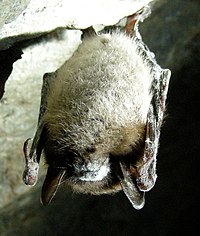
Photo from wikipedia
White-nose syndrome (WNS)-positive little brown bats (Myotis lucifugus) may exhibit immune responses including increased cytokine and pro-inflammatory mediator gene levels. Bioactive lipid mediators (oxylipins) formed by enzymatic oxidation of polyunsaturated… Click to show full abstract
White-nose syndrome (WNS)-positive little brown bats (Myotis lucifugus) may exhibit immune responses including increased cytokine and pro-inflammatory mediator gene levels. Bioactive lipid mediators (oxylipins) formed by enzymatic oxidation of polyunsaturated fatty acids can contribute to these immune responses, but have not been investigated in WNS pathophysiology. Nonenzymatic conversion of polyunsaturated fatty acids can also occur due to reactive oxygen species, however, these enantiomeric isomers will lack the same signaling properties. In this study, we performed a series of targeted lipidomic approaches on laboratory Pseudogymnoascus destructans-inoculated bats to assess changes in their splenic lipidome, including the formation of lipid mediators at early stages of WNS. Hepatic lipids previously identified were also resolved to a higher structural detail. We compared WNS-susceptible M. lucifugus to a WNS-resistant species, the big brown bat (Eptesicus fuscus). Altered splenic lipid levels were only observed in M. lucifugus. Differences in splenic free fatty acids included both omega-3 and omega-6 compounds. Increased levels of an enantiomeric monohydroxy DHA mixture were found, suggesting nonenzymatic formation. Changes in previously identified hepatic lipids were confined to omega-3 constituents. Together, these results suggest that increased oxidative stress, but not an inflammatory response, is occurring in bats at early stages of WNS that precedes fat depletion. These data have been submitted to metabolomics workbench and assigned a study number ST002304.
Journal Title: Journal of proteome research
Year Published: 2022
Link to full text (if available)
Share on Social Media: Sign Up to like & get
recommendations!